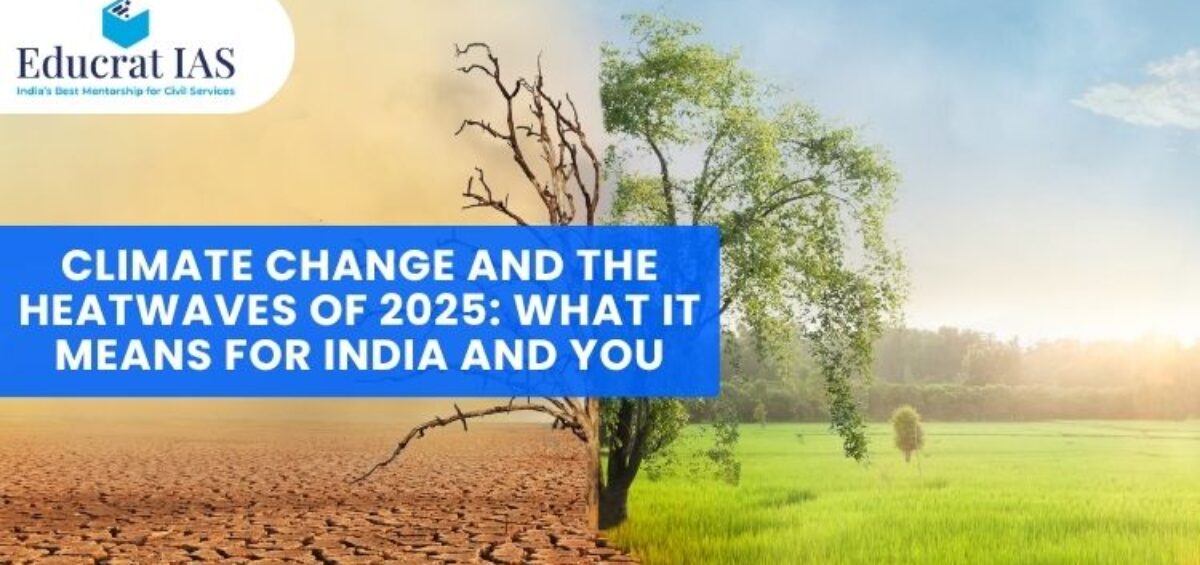Can You Feel the Heat Rising in Kolkata? You’re Not Alone.
It’s only July, and temperatures across Kolkata and nearby areas have already broken records. The scorching afternoons, sleepless humid nights, and frequent power cuts — they’re not just part of summer anymore. They’re part of a climate shift that’s getting harder to ignore.
This year’s heatwaves across India have been longer, hotter, and deadlier. If you’ve wondered why summer feels more intense every year, you’re not imagining it. It’s climate change, and the heatwaves of 2025 are its loudest alarm yet.
Why Are 2025’s Heatwaves Breaking All Records?
The Data Speaks for Itself
India Meteorological Department (IMD) reports show that June and July 2025 have seen temperatures exceed 47°C in parts of eastern and northern India. Kolkata recorded its highest night temperature in over two decades — a troubling sign of what’s being called “urban heat island effect”.
Key contributors include:
-
Rapid urbanization and loss of green cover
-
Rising CO₂ levels and global temperature rise
-
El Niño’s strong presence in the Pacific
These factors, combined, are turning once-rare heatwaves into a new normal.
But Wait — There’s More You Should Know…
Heatwaves Are Not Just Uncomfortable — They’re Dangerous
Beyond the sweaty discomfort lies a much more serious concern. Heatwaves in 2025 have led to a sharp rise in heatstroke cases, dehydration-related deaths, and water scarcity, especially in urban slums and rural belts.
Vulnerable groups include:
-
The elderly and children
-
Outdoor laborers (construction, delivery workers)
-
People with chronic health issues
And the worst part? Most of these impacts are preventable with proper awareness and infrastructure — something India urgently needs to invest in.
How Climate Change Is Impacting Kolkata and Eastern India
A Localized Look at a Global Problem
Kolkata’s changing weather patterns show clear signs of climate stress. From irregular rainfall to intense humidity and extreme heat, the region is witnessing:
-
Increased frequency of heatwaves
-
Longer dry spells followed by intense rainfall
-
Declining air quality during summer months
In areas like Howrah, Barrackpore, and Salt Lake, citizens are experiencing poor public health outcomes due to extreme heat. The lack of green cover and water management is only making it worse.
The Science Behind Heatwaves and Climate Change
Why the Earth (and India) Is Heating Up
Climate change is driven by increased greenhouse gas emissions, mainly from fossil fuels. These gases trap heat in the atmosphere, disrupting global climate systems.
Key science-backed facts:
-
According to NASA, 2023 and 2024 were among the warmest years ever recorded.
-
India’s average temperature has risen by 0.7°C since 1901, but the pace has accelerated post-2000.
-
Urban centers like Kolkata act as “heat pockets,” absorbing and retaining more heat due to concrete structures and traffic emissions.
What Can You Do? Climate Awareness Starts with Action
Individual Steps Matter — And So Does Collective Policy
If you live in Kolkata or nearby districts, you’re likely already experiencing the effects. But small steps at the local level can help build climate resilience:
As individuals:
-
Stay hydrated, wear light clothing, avoid peak sun hours
-
Support tree-planting and rainwater harvesting initiatives
-
Reduce air conditioning use by improving ventilation and insulation
As a society:
-
Push for climate-resilient urban planning
-
Advocate for heatwave warning systems and community cooling shelters
-
Demand accountability in climate policy at both state and national levels
Educrat IAS regularly covers such issues in GS Paper III and Essay prep. Explore our Environment & Ecology modules to strengthen your understanding.
Why UPSC Aspirants Must Study the Heatwaves of 2025
It’s a Must-Know for GS, Essay, Ethics, and Interview
This topic blends current affairs, environment, disaster management, and public policy — exactly the kind of intersection UPSC loves.
You might be asked:
-
“How should India prepare for future climate-induced disasters?”
-
“Discuss the effectiveness of the National Action Plan on Climate Change (NAPCC).”
-
“What is India’s global responsibility in climate leadership?”
Pro Tip: Support your answers with real-time data from 2025 heatwave patterns. It shows awareness and depth.
For more insights, check our UPSC Mains Current Affairs series and model essay examples.
Let’s Make It Easier: Learn Climate-Linked Topics with Experts
At Educrat IAS, we focus on integrated UPSC preparation that aligns with current events, GS static concepts, and answer-writing frameworks. Our faculty helps you connect the dots — from El Niño to urban planning and Indian climate policy.
📞 Need help with UPSC GS or Essay? Dial +91 91473 88921
📚 Or visit: https://educratias.com/
FAQs – Climate Change & Heatwaves
1. What is the main reason behind the 2025 heatwaves in India?
A combination of climate change, El Niño, urban heat islands, and deforestation contributed to the extreme temperatures in 2025.
2. How is Kolkata specifically affected?
Kolkata experienced record nighttime temperatures and high humidity, worsening public health conditions and straining electricity and water infrastructure.
3. Will this topic be important for UPSC 2025?
Yes. It is highly relevant for GS Paper III (Environment, Disaster Management), Essay Paper, and Interview discussions.
4. How can I link current affairs like this to UPSC preparation?
Join integrated classes that blend current events with syllabus concepts. Educrat IAS offers such modules for targeted preparation.
5. Are there government schemes related to heatwaves?
Yes. The National Disaster Management Authority (NDMA) has released Heatwave Action Plans for many states, and cities are adopting early-warning systems.
Follow us on our social media channels for the latest updates:
Telegram : Join our Telegram community for daily current affairs, free PDFs, and important UPSC updates.
Instagram: Follow us on Instagram for quick tips, answer writing guidance, reels, and motivational posts.
Facebok: Like our page to stay connected with webinars, UPSC trends, and student success stories.
X : Follow us for crisp analysis of editorial opinions, government policies, and international affairs.
Call us now at +91 91473 88921 or visit educratias.com to start your UPSC journey with Kolkata’s most trusted institute!
Don’t just scroll—engage, learn, and transform your preparation with Educrat IAS!






